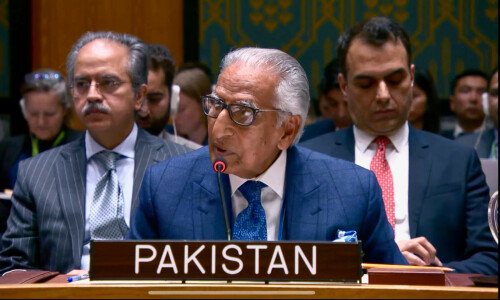ISLAMABAD: While Covid-19 vaccines are new and there are chances of adverse effects after vaccination, a comprehensive system has been put in place for monitoring post-immunisation events, said the Ministry of National Health Services.
Moreover, World Health Organisation (WHO) and the Drug Regulatory Authority of Pakistan (Drap) on Monday held a training session on monitoring of possible adverse events following immunisation.
It may be noted that 500,000 Covid-19 vaccines of Sinopharm company donated by the Chinese government arrived in Pakistan after which the vaccination drive was launched by Prime Minister Imran Khan on Feb 2.
In the initial phase, frontline workers and primary healthcare professionals are being vaccinated after which elderly people would be covered.
WHO, Drap arrange training session on post-immunisation monitoring
The training session, ‘Monitoring of adverse events following immunisation (AEFIs) of Covid-19 vaccines’ was attended by representatives from Pakistan National Pharmacovigilance Centre, (PNPC), Drap, federal Expanded Programme on Immunisation (EPI, provincial EPIs and focal persons of pharmacovigilance from provinces.
The participants were informed that Covid-19 vaccination will be carried out through adult vaccination counters (AVCs) established at 582 health facilities across the country.
All AVCs will have focal persons who will share data on AEFI reporting forms with the offices of the district health officers (DHO) on a daily basis where these will be compiled weekly.
The weekly reports will be entered into the EPI Management Information System (EPI-MIS). Sindh and Punjab will share their data in hard format/excel sheets because the EPI-MIS is not yet rolled out there.
The committee at the national level will supervise the activities related to AEFI.
PNPC Assistant Director Aqsa Hashmi briefed the participants about filing reports that included e-reporting system and MedSafety mobile application. The MedSafety App was installed on mobile phones of the participants and a hands-on training was also provided.
It was acknowledged that there is a need to strengthen the coordination mechanism among stakeholders.
It was decided that PNPC will provide necessary logins of database to the federal EPI for entry and sharing with Drap.
WHO representative Macheal Ukiwa told the participants that the vaccines were new and there were chances of rumours among the public and fake news about safety of the vaccines.
“It is in the responsibility of WHO to minimise the risk associated with treatment options. This training session is for the purpose of ensuring safety of Covid-19 vaccines in Pakistan. Furthermore, it is also an international requirement that necessary refresher training may be provided to stakeholders involved in AEFI monitoring,” he said.
Drap Chief Executive Officer Dr Asim Rauf said the registration board of the authority had granted emergency authorisation to three Covid-19 vaccines. However, the safety of these vaccines could never be comprised that is why the training session has been arranged in order to strengthen the procedure and tools for collection of AEFI and enhance coordination among stakeholders.
“It is time that we must give due consideration to safety monitoring of these vaccines. It would not only monitor the harms of Covid-19 vaccine but will also build public trust in these vaccines that will help smooth vaccination,” he said.
He appreciated the Division of Pharmacy Services for its efforts in approval of the clinical trials and registration of Covid-19 vaccines.
Dr Abdur Rashid, director Division of Pharmacy and head of PNPC, explained the role of Drap in general and the Division of Pharmacy Services in particular in the process of approval of clinical trials of the vaccines.
Published in Dawn, February 9th, 2021















































